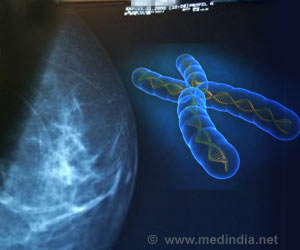Patients with HER2-positive breast cancer might someday undergo immune status monitoring with blood tests before, during and after the treatment.

‘Patients whose tumors shrank during standard pre-surgery drug treatment had much stronger anti-HER2 responsivity, compared to patients whose tumors responded less completely.’





"We know that it's not a fixed immune defect, because we have several clinical trials open where we're vaccinating people and can restore anti-HER2 responsivity," said the study's senior author Brian J. Czerniecki, MD, PhD, the Rhodes-Harrington Professor in Surgical Oncology at Penn and the co-director of the Rena Rowan Breast Center at Penn's Abramson Cancer Center. An Immune Marker for Recurrence Risk
Czerniecki and colleagues have been investigating the role of the immune system in breast cancer, and the potential of cancer vaccines, for most of the past two decades. Their most recent research has focused on the T-helper type 1, or Th1, immune response in cancer, in which 'helper' T cells mobilize killer cells to attack cancer-related targets.
In the new study, the Penn team, including first author Jashodeep Datta, MD, a general surgery resident and a member of the Czerniecki laboratory, isolated immune cells from 95 women with invasive HER2-positive breast cancer, and analyzed the cells' ability to mount a Th1 response against the HER2 growth factor receptor protein. HER2-positive breast cancer cells overexpress the HER2 receptor to help drive their rapid proliferation.
The team found that, by a standard measure, the cells from women with recently recurrent cancer that had not yet been re-treated had only about a tenth of the anti-HER2 responsivity compared to that seen in women whose HER2+ breast cancer had not recurred for at least two years following treatment.
Advertisement
The low anti-HER2 responsivity seen in the women with recurrent cancer was not part of a broader immune suppression. "We detected no other immune deficit -- just the deficit in the anti-HER2 response," Czerniecki said.
Advertisement
How patients lose their anti-HER2 responsivity during the formation and growth of a HER2-positive tumor isn't yet clear. "The thinking is that the patient's anti-HER2 T cells somehow become exhausted and die or otherwise stop responding," Czerniecki said. "We're trying to determine the mechanism, but we already know that we can 'fill the tank' with vaccines to restore that specific responsivity to HER2."
In addition to conducting ongoing mechanistic studies and vaccine trials, Czerniecki says his team hopes to confirm the association between anti-HER2 responsivity and cancer recurrence risk in larger clinical trials that would track patients' immune status over time.
Source-Eurekalert















